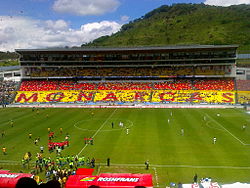| This article needs additional citations for verification. Please help improve this article by adding citations to reliable sources. Unsourced material may be challenged and removed. Find sources: "Estadio Morelos" – news · newspapers · books · scholar · JSTOR (February 2013) (Learn how and when to remove this message) |
| Coloso del Quinceo "Colossus of Quinceo" El Majestuoso "The Majestic" | |
 | |
 | |
| Full name | Estadio José María Morelos y Pavón |
|---|---|
| Location | Morelia, Michoacán, Mexico |
| Owner | State of Michoacán |
| Operator | Jesus Alanis Cornejo |
| Capacity | 35,000 |
| Field size | 110 m × 70 m (360 ft × 230 ft) |
| Surface | Grass |
| Construction | |
| Opened | April 9, 1989 |
| Renovated | 2011 |
| Construction cost | US$20,000,000.00 |
| Architect | David Fuentes Arrona |
| Tenants | |
| Atlético Morelia (1989–present) Morelia Femenil (2017–2020) | |
Estadio Morelos is a football stadium located along Periférico Independencia, in the Independencia sector, near the base of Cerro del Quinceo in northwest Morelia, Michoacán, Mexico. It is the site of professional football teams, it currently is the site of Atlético Morelia in the Liga de Expansión MX, Mexico's second division. It used to host Monarcas Morelia in the top division of Mexican football and Monarcas Primera A in the league under that. This structure holds various events, such as concerts, religious gatherings, and mass. Its official name Estadio José María Morelos y Pavón honors a hero of the Mexican War of Independence.
The stadium has an irregular shape, because the areas behind the goals only have one level and 32 rows, along the side there are 4 levels (one grandstand, one other seating area and two box areas) and 49 stands.
According to the Monarcas Morelia website, the capacity of the stadium is 35,000.
History
The city of Morelia before the existence of this structure, counted on the Estadio Venustiano Carranza as the home of first division side, Atlético Morelia. In 1984, two years before the 1986 FIFA World Cup held in Mexico, it was officially announced that Morelia would be one of the sites for the tournament, and a scale model of the new stadium was shown, very similar in capacity and structure to the Estadio Corregidora of Santiago de Querétaro, and would be located in the Southeast of the city, on the current grounds of the sport unit of Adolfo López Mateos. Excavation work soon began but problems in the foundation led to the suspension of the work and no other sites were sought. The World Cup site was transferred to the Estadio Sergio León Chavez, in Irapuato.
Following the league tournaments of 1986–1987 1987–1988, despite not reaching the finals, the local side put on 2 brilliant displays in the liguilla. Demand for the new structure resurged. A group of Michoacán businessmen led by Luis Álvarez Barreiro, and with support from the new governor, Luis Martínez Villicaña, created a pro-construction sponsorship which was financed privately by ticket sales. At the conclusion of the construction, the sponsorship was handed over to the state of Michoacán. The stadium was one of the venues for the 2011 FIFA U-17 World Cup.
On February 16, 2016, during his first visit to Mexico, Pope Francis spoke to an estimated 50,000 young people at the stadium.
See also
References
- "Monarcas Morelia". www.fuerzamonarca.com. Retrieved Aug 6, 2020.
- Ahmed, Azam; Yardley, Jim (Feb 16, 2016). "Pope Francis Entreats Mexico's Youth to Resist Call of Drug Cartels". The New York Times. Retrieved Aug 6, 2020 – via NYTimes.com.
External links
- [REDACTED] Media related to Estadio Morelos at Wikimedia Commons
- World Stadiums entry Archived 2012-03-07 at the Wayback Machine
- A Tour Of The Stadium
19°43′07.47″N 101°14′01.04″W / 19.7187417°N 101.2336222°W / 19.7187417; -101.2336222
This article about a sports venue in Mexico is a stub. You can help Misplaced Pages by expanding it. |